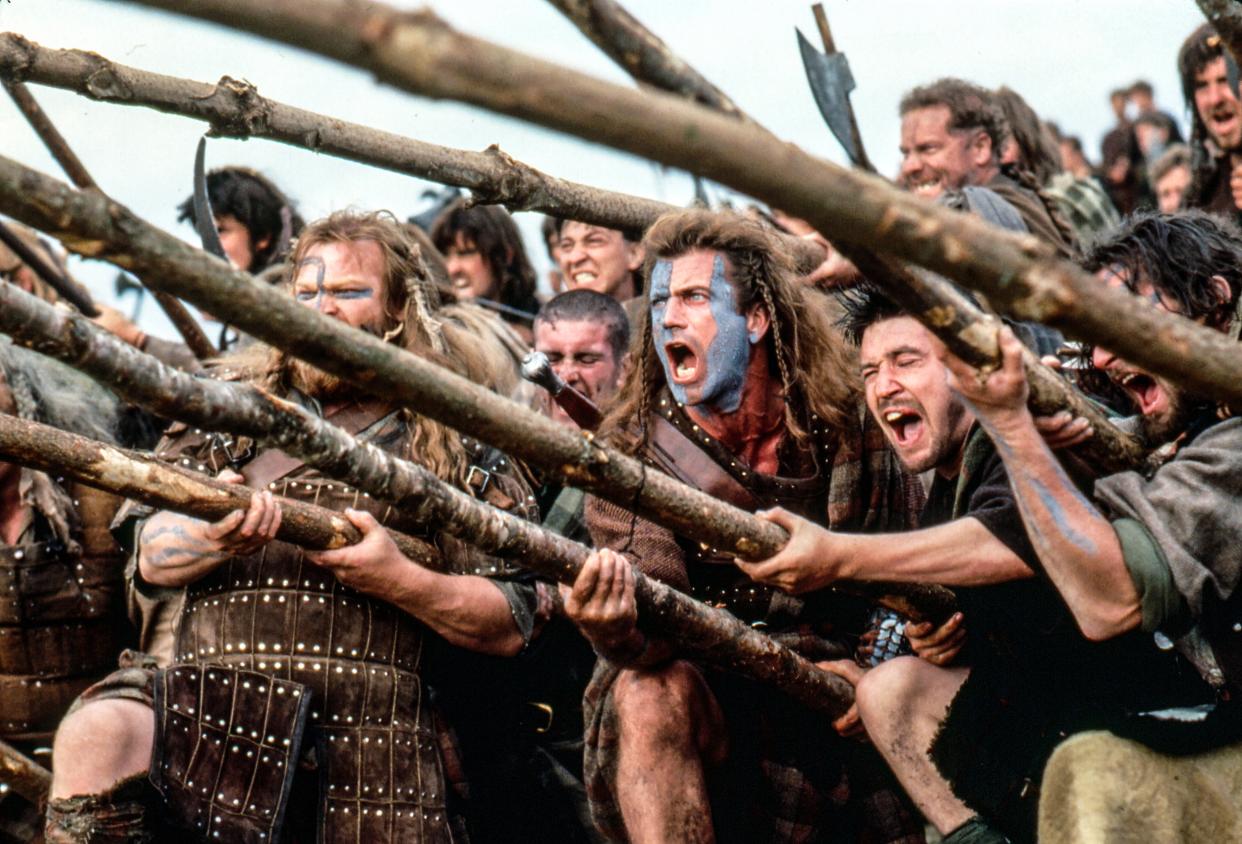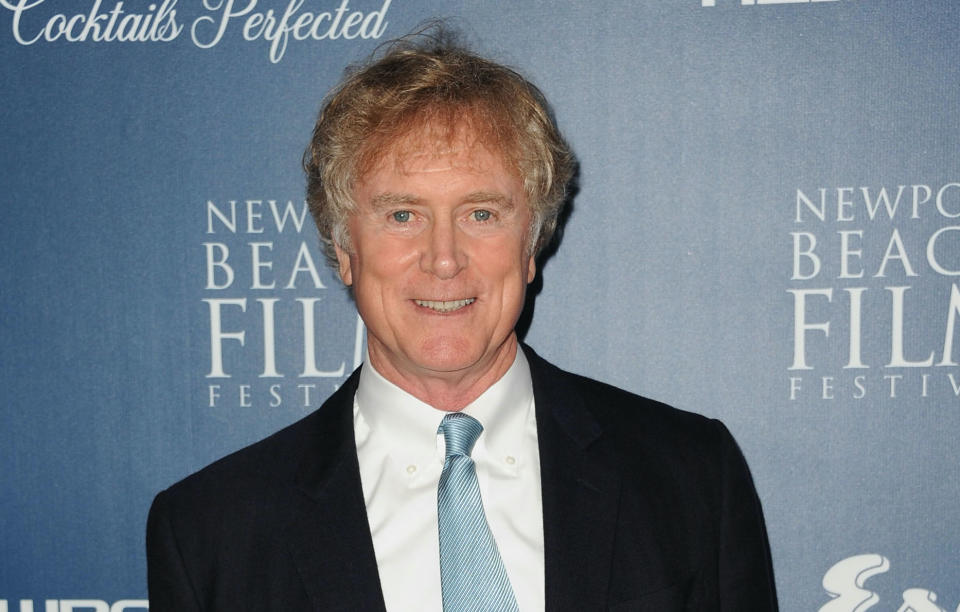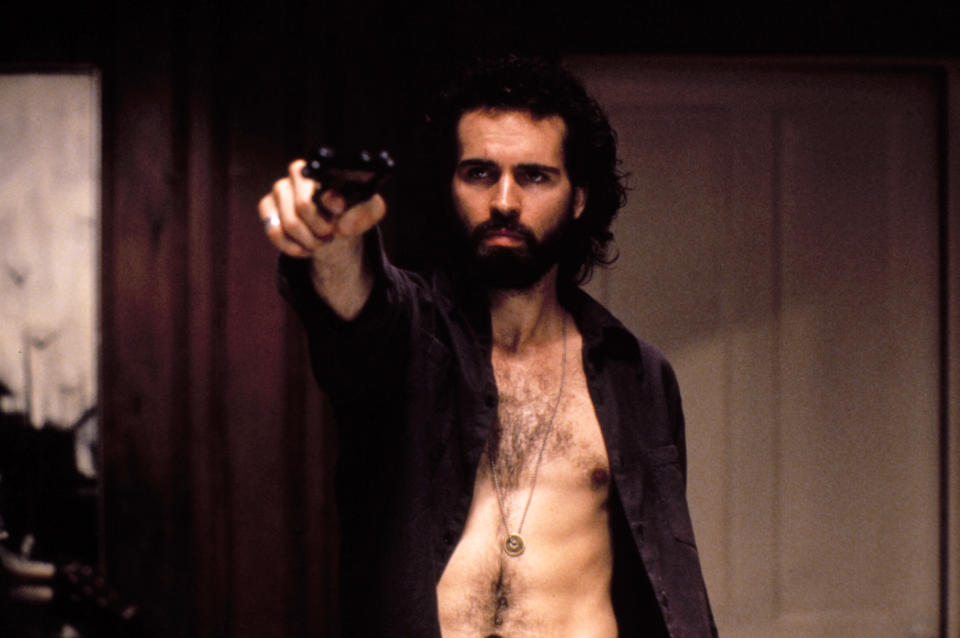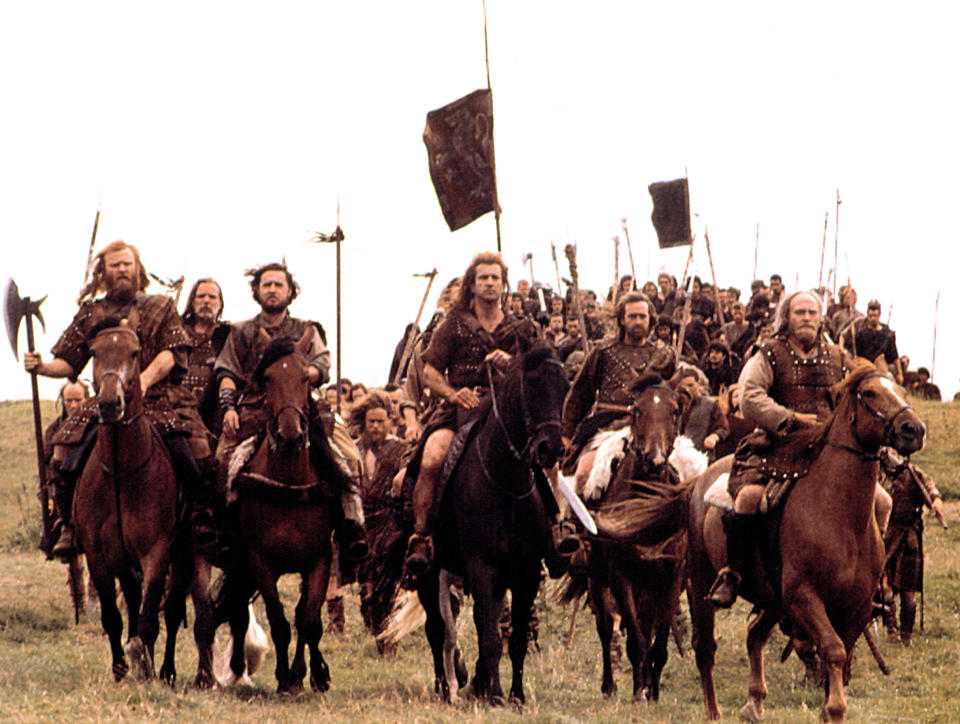'Braveheart' at 25: Why director and star Mel Gibson almost didn't play Scottish rebel hero William Wallace in the Oscar-winning war favorite

You never forget your first day on a movie set… particularly when that first day involves 2,000 extras screaming bloody murder. That’s how songwriter-turned-author-turned-screenwriter Randall Wallace entered the movie business when he showed up in Ireland to watch Mel Gibson call “Action!” on Braveheart, Wallace’s first feature film script. Based on the legend of medieval Scottish freedom fighter, William Wallace (no relation to the writer), the three-hour epic’s centerpiece is a rousing recreation of the Battle of Stirling, where Wallace (played by Gibson) leads his ragtag army of Scots to an upset victory over the royal forces of England. Prior to the battle, Wallace addresses his troops in a fictional speech that’s since been enshrined in cinematic history for a quarter century since the movie’s release on May 24, 1995.
“My first day on set was for the ‘Sons of Scotland’ speech,” Wallace tells Yahoo Entertainment, setting the scene for that memorable event. “We had 2,000 extras and when Mel came riding out he was William Wallace, not Mel Gibson. There was a breathless hush over the whole field, and then I heard the words that I had written a year-and-a-half before: ‘You’ve come to fight as free men, and what will you do with your freedom? Will you fight?’” As Wallace tells it, Gibson’s words proved so inspiring that his “soldiers” reacted as if they were about to fight a for-real battle. “The extras suddenly screamed, ‘Yes, we’ll kill them all!’” he recalls. “That wasn’t supposed to happen in that moment. What that said to me is that truth inspires, and they felt the truth of it. It became real.”
That moment on the battlefield fulfilled a promise that Gibson made to Wallace before filming began. “We were alone in a restaurant in London: Mel was already the biggest star in the world and I was an unknown writer, but he treated me with respect. He said, ‘This script is huge — it’s big-hearted and bold-hearted. It is you. I’m going to give it all I have, and I’m going to cast people who are in their essence the characters we want them to play.’ That’s one of the most brilliant things I’ve ever heard about filmmaking: You can’t fake anything. The camera sees, and the audience sees, whether you believe in your movie’s reality or not.”
Millions of moviegoers believed in Braveheart’s reality, even if the film takes enormous liberties with the historical record, as both Gibson and Wallace have acknowledged. The movie grossed over $200 million worldwide and took home five Oscars, including statues for Best Director and Best Picture. (Wallace — who went on to write and direct such films as The Man in the Iron Mask and Heaven Is For Real — received a nomination for Best Original Screenplay, but lost to The Usual Suspects scribe, Christopher McQuarrie.)

And, to this day, Wallace’s “Sons of Scotland” speech is quoted by real-world soldiers, athletes and even Scottish politicians. “‘They may take our lives, but they'll never take our freedom’ is on the wall of the United States Air Force Academy under the name William Wallace,” the screenwriter says, with a laugh. “And of course, William Wallace never said that — I said that! I’ve been meaning to write to the English department at the Academy.’”
With a 25th anniversary Blu-ray edition of Braveheart set for release on June 16, Wallace shares some behind-the-scenes stories and secrets from the film’s production.
Jason Patric almost played William Wallace

According to Hollywood lore, there’s a world in which Brad Pitt would have delivered the “Sons of Scotland” speech while Gibson stayed behind the camera. But Wallace says that Pitt — who broke through with a scene-stealing role in 1991’s Thelma & Louise, followed by heartthrob star turns in Interview With a Vampire and Legends of the Fall — was never in serious consideration for the part. “I’ve met Brad Pitt and he’s amazing, but he wasn’t really discussed that much for it.” Instead, Wallace remembers Gibson being much more interested in recruiting Jason Patric for the role.
“Mel talked a lot about him,” the writer says of The Lost Boys star, who was coming off critically-acclaimed performances in dramas like After Dark, My Sweet and Rush. As far as Wallace was concerned, though, Gibson was the only person he could see commanding an army of Scotsman. “In the scheme of things, I cast Mel, and Mel cast everyone else. He was the only one I could imagine who had the sensitivity and the energy to play both the masculinity and the tenderness of William Wallace.” (Wallace cast Gibson again in his 2002 Vietnam War movie, We Were Soldiers.)
But Gibson resisted pulling double duty as director and star, largely because he felt that he was too old to convincingly portray the 27-year-old hero that Wallace described on the page. “He expressed those concerns to me several times, and I had to take the lead in reassuring him. I told him that my father-in-law had been a Bombardier navigator and a prisoner of war in Germany for two years during World War II, and he'd done all that starting when he was 19 years old. But if you filmed a 19-year-old in that exact situation, he would look far too young and the audience wouldn't believe it. It would look like a kindergartner or a high schooler, which they basically were. These are real-world heroes, but movies are impressionistic paintings. My part of the process at that point was to get the right guy, and if we hadn't gotten Mel, the movie’s history would have been really different.”
The “Sons of Scotland” speech took 12 drafts to get right
Wallace wrote — and rewrote — his Oscar-nominated screenplay 12 times before sending it out into the world. And he lavished particular care on Wallace’s seminal speech, continually refining it on his own and, later, with Gibson. “The big thing for me was to feel it myself,” he explains. “The line, ‘They may take our lives, but they'll never take our freedom,’ came out of me being on my knees almost daily as I wrote that story. I was always thinking to myself: ‘Let me not be doing what I think Hollywood wants — let me be doing what I know is true for me. Even if I fail in this effort, I had the freedom to do this.’”
When Mel came riding out, he was William Wallace, not Mel Gibson. "Braveheart" screenwriter, Randall Wallace
Those dozens of drafts paid off with a speech that Wallace regularly hears repeated back to him in real and reel life. “It’s amazing to hear people scream, ‘Freedom!’ I hear it in the cartoons that my youngest son watches — the animated characters will do the Braveheart scream. And I’ve seen other lines like ‘Every man dies, not every man really lives’ on posters and quoted at funerals. It’s staggering for me.”
Gibson brought the gore

On the page, Braveheart reads like a period war epic in the tradition of vintage Hollywood spectacles like Spartacus. But Gibson brought a level of brutality to the battle sequences that never would have been allowed in the industry’s Golden Age. Throats are slit, heads are smashed and bodies are stabbed, unleashing jets of the sticky red stuff. “Mel is always looking for how to do something in the most impactful way possible, and it's sort of a joke between him and me that he wants to find a bloody way to do it,” Wallace says. “I don’t remember which great artist said it, but I always think of the line, ‘You never know what is enough, until you know what is too much.’ You're a part of the process to push the envelope as far as you can then say, ‘OK, that's too much. Let's pull back.’”
Gibson had to pull the bloodshed back a fair amount after early cuts of Braveheart were slapped with the MPAA’s recently-created NC-17 rating. “The theatrical release is less gory than some of the original things that he had shot,” Wallace admits. “The interesting thing is that Braveheart is now embraced by people who are hyper-vigilant about levels of violence and sexuality. Clips are shown in churches all over, and Braveheart is sold in the school store at Liberty University, where students sign a pledge that says they won’t watch R-rated movies. They don’t see a contradiction in that, because the values that Braveheart upholds are the values that they want to live their lives by. There’s a level of, ‘Does this violence feel gratuitous and put in for the sake of pandering to the lowest urges of people,’ or ‘Does this violence tell people this is how desperate life can be and this is why love and courage and sacrifice are not just desirable — they're crucial.’”
One of Wallace’s favorite scenes was never filmed

Braveheart already clocks in at a weighty three hours, but in recent years Gibson has teased a four-hour version that he’d happily assemble if Paramount provided the funds. For his part, Wallace calls the theatrical release “the most effective cut,” but would love for fans to see the longer version. But one of his favorite missing scenes wouldn’t be included in that lost hour — because it was never filmed. “I originally wrote three different dream sequences where William is visited by Murron,” the writer says, referring to Wallace’s wife (played by Catherine McCormack) whose murder by English soldiers instigates his rebellion. “She dies so early in the story, and I felt that would leave us wanting to feel how the person we love the most keeps coming back to us.”
I think that "Braveheart" is the most masculine possible movie. "Braveheart" screenwriter, Randall Wallace
Ultimately, Gibson decided to only include one of those dream sequences — saving it for the end of the film where Murron appears to Wallace in the midst of his brutal death. “I wept as I wrote that scene,” Wallace says now. “I vividly remember sitting in my office, writing ‘The ax falls towards William Wallace's throat.’ Then I paused and thought, ‘Well, we can't show the ax sever his head. What do I show here? What would he do at the last moment of his life?’ So I typed: ‘In the last instant of his life, William Wallace turns his eyes for the crowd,’ and in that instant, I realized that Murron would be there to tell him, ‘I am where you are going.’”
“People say to me, ‘Why do you like to write war stories?’ And I always say, ‘I don't — I write love stories,’” Wallace continues. “I want to know what you love that makes your life worth living or even worth surrendering if you need to. I think that Braveheart is the most masculine possible movie: It tells men who they are and who they want to be. I’ve got deep ties with the military, and of course the guys love the movie. But what you find when you get to know military families is that their wives are the center of the family. So at the same time, it’s an incredibly female-centric movie: It honors women that keep the family together when the men go off and then come home.”
Braveheart wasn’t intended as a political statement

Since its 1995 release, Braveheart is often credited — and, in some quarters, blamed — with inspiring modern Scotland’s push for independence. “Every time Scotland talks about leaving the United Kingdom, I get asked how I feel about it,” Wallace says. “And I always say, ‘I’m an American!’ I love Scotland and I want what’s best for Scotland like I want what’s best for everyone. It’s not a movie about politics in any way.”
That includes sexual politics: Over the years, Braveheart has been heavily criticized for its portrayal of Prince Edward (Peter Hanley) as, in the words of the Gay and Lesbian Alliance Against Defamation, a “typical homophobic caricature.” In one of the movie’s most notorious scenes, Edward’s father, “Longshanks” (Patrick McGoohan) throws his son’s male lover out of a window. During the film’s theatrical run, GLAAD oversaw protests that denounced Braveheart and its director. “I absolutely understood the controversy, and there was no desire whatsoever on anyone’s part to endorse the persecution of homosexuality,” Wallace says now. “The whole point of that scene was to show who Edward Longshanks was, and not to be political. I don’t think the movie is political in the least.”
Braveheart is currently available to rent or purchase on Amazon and Vudu; pre-order the 25th anniversary Blu-ray edition of Braveheart at Best Buy and Walmart.
Read more from Yahoo Entertainment:

